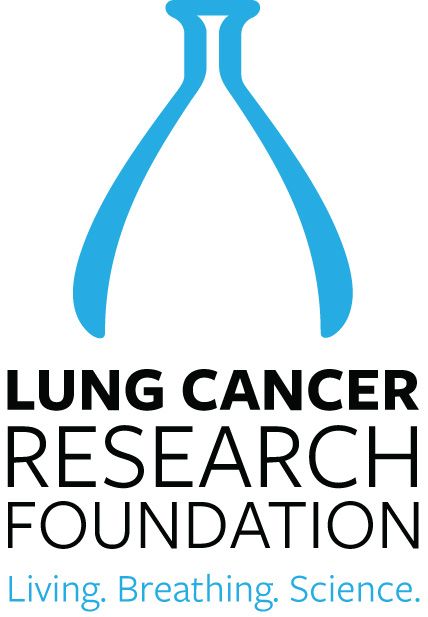
LCRF News: November 2022

November is Lung Cancer Awareness Month!
Here’s how you can help
Every year in November, people around the world work together to recognize and raise awareness of the challenges that come from a diagnosis of lung cancer. Awareness is the first step to prevention. Funding research is the first step towards finding treatments that will prolong and save lives. Learn the
LCRF provides many ways for you to show your support, including social media graphics.
Scientific Symposium – Recording Available
LCRF launched Lung Cancer Awareness Month with its annual Scientific Symposium, moderated by LCRF Scientific Advisory Board Chair, Dr. Katerina Politi and featuring a State of Lung Cancer Research address by Dr. Antoinette Wozniak, followed by a roundtable discussion on Biomarkers and Biology.
Panelists for the roundtable included: David J. Kwiatkowski, MD, PhD, Senior Physician, Brigham and Women’s Hospital, Dana-Farber Cancer Institute; Trudy G. Oliver, BSc (Hons), PhD, Principal Investigator, Associate Professor, Huntsman Cancer Institute Endowed Chair in Cancer Research; Christian Rolfo, MD, PhD, MBA, Professor and Assoc. Director for Clinical Research, Center for Thoracic Oncology, The Tisch Cancer Institute; Kurt Schalper, MD, PhD, Associate Professor of Pathology, Director, Translational Immuno-oncology Laboratory, Yale School of Medicine; and Alison Taylor, PhD, Assistant Professor of Pathology and Cell Biology, Columbia University, Herbert Irving Comprehensive Cancer Center.
Learn About Laura Greco and her Die, Cancer, Die! Campaign
Learn about Laura Greco and the #DieCancerDie movement which started with a single photo. Visit the website for social media shareables or to buy a t-shirt through her fundraiser for lung cancer research.
Lunges for Lung Cancer is Back!
Are you on Facebook? Join our online
This year’s challenge is to log a collective 10,000 or more lunges and raise $10,000!
#TogetherSeparately Monthly Livestreams & Facebook Group
LCRF hosts webinars to bring the lung cancer community together to discuss topics important to them.
View past #TogetherSeparately webinars here:
December’s #TogetherSeparately: Communicating with your Healthcare Team
Monday, December 12, 2022, 12:00pm - 1:00pm EST
Dr. Isabel Preeshagul will be joined by Dr. Cardinale B. Smith from the Tisch Cancer Center at Mount Sinai for our Lung Cancer Community Talk on Monday, December 12th at 12 PM ET. This livestream is an opportunity to connect face-to-face with others who care about lung cancer and talk about challenges we’re facing, #TogetherSeparately. We hope you'll join us for this important discussion on communicating with your healthcare team - including questions to ask your doctor, tips for improving communication with your care team, guidance for “my first visit”, advocating for your needs, and more. Registration opens November 10 at
Newly Updated Educational Resources Available:
Updated Clinical Trials educational resource is now available at LCRF.org/clinicaltrials
Clinical trials are research studies that test new and promising treatments directly with patients. In fact, today’s gold standard treatment options were once studies in a clinical trial. These studies may also test new ways to prevent or diagnose diseases such as lung cancer. Clinical trials may include new ways to take medicine, radiation therapy, or surgery. Clinical trial teams make sure you receive the safest and best care. If you are recently diagnosed, you do not need to wait to consider a clinical trial for your treatment. No matter where you are in your treatment process, a clinical trial could be a good option for you.
LCRF updates its Comprehensive Biomarker Testing educational resource, now available for download:
You do not need to be a doctor to understand your tumor. Biomarker testing can help.
When your doctors suspected you had cancer, they took a small portion of your tumor tissue (a biopsy) to have it examined. A specialist, called a pathologist, looked at your tumor cells under the microscope and found out you had lung cancer. There are two main types of lung cancer–small cell lung cancer (SCLC) or non-small cell lung cancer (NSCLC). If you have NSCLC, the pathologist looks closely at the cancer cells for certain characteristics (features or qualities). Tumors with similar characteristics are referred to as subtypes. Adenocarcinoma (A-deh-noh-KAR-sih-NOH-muh) and squamous cell carcinoma (SKWAY-mus sel KAR-sih-NOH-muh) are the most common subtypes of NSCLC. Once your health care team knows the subtype of your cancer, treatment planning can begin. Read more & download your copy at
LCRF News:




